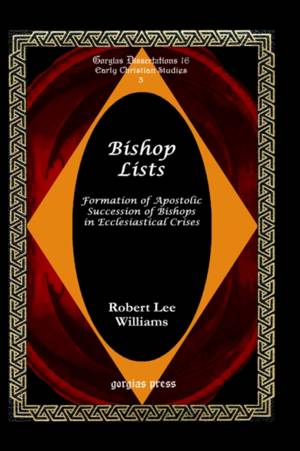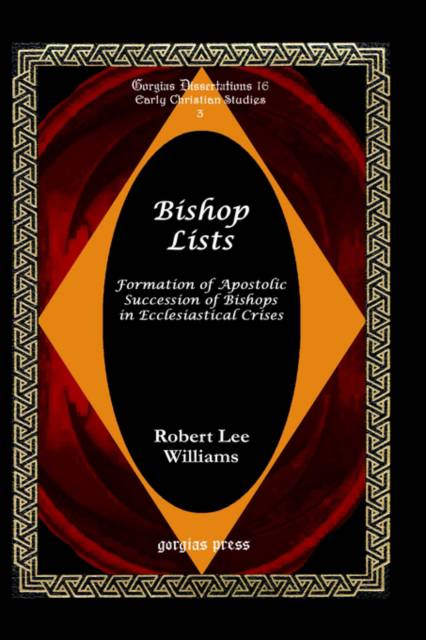
- Retrait gratuit dans votre magasin Club
- 7.000.000 titres dans notre catalogue
- Payer en toute sécurité
- Toujours un magasin près de chez vous
- Retrait gratuit dans votre magasin Club
- 7.000.0000 titres dans notre catalogue
- Payer en toute sécurité
- Toujours un magasin près de chez vous
Bishop Lists
Formation of Apostolic Succession of Bishops in Ecclesiastical Crises
Robert Lee Williams, R L Williams
178,95 €
+ 357 points
Description
The five appearances of bishop lists in the early church mark the principal points at which apostolic succession of bishops emerged and developed into a crucial and well defined doctrine. Walter Bauer long ago termed these lists, legitimately if not charitably, ôliterary propaganda.ö This study delves into the political struggles surrounding the lists and the doctrine they served to define. The ancient Mediterranean world established legitimacy of authority in social institutions, whether Roman, Greek, Jewish, or Christian, by citing successions of leaders. In early catholic churches, apostolic succession was the linchpin in the three ôpillarsö of tradition, succession, and canon. It guaranteed the first and assured interpretation of the third. A social history approach reveals political intrigue at every point of the development of the doctrine of apostolic succession. In crises of the first century, the New Testament recorded (monepiscopal?) bishops and succession, and Ignatius and 1 Clement make monepiscopacy and apostolic succession explicit. In the second and third centuries, writers employed episcopal successions in reaction to subsequent struggles with heresy and schism. By the fourth century, Eusebius employed succession lists for apologetic and edification. Ecclesiastical politics in each case reflects the threat to the bishopÆs authority and clarifies the meaning of apostolic succession in the ChurchÆs development. This social history approach, examining the function of the literature within its historical circumstances, reveals how theology developed from politics. The development is as gripping politically as it is illuminating theologically. Robert Lee Williams is Professor of Biblical Theology at Southwestern Baptist Theological Seminary in Fort Worth, Texas. He has written a number of articles focused on New Testament and patristic topics from the vantage point of social-scientific methodology. Accordingly, Williams has been active in the SBL Social World of Early Christianity, the North American Patristics Society, the International Conference on Patristic Studies, and the Seminar on the Development of Early Catholic Christianity, and the American Society of Church History. Bishop Lists: Formation of Apostolic Succession of Bishops in Ecclesiastical Crises is a revision of his doctoral dissertation in New Testament and Early Christian Literature completed under Robert M. Grant at the University of Chicago.
Spécifications
Parties prenantes
- Auteur(s) :
- Editeur:
Contenu
- Nombre de pages :
- 288
- Langue:
- Anglais
- Collection :
- Tome:
- n° 3
Caractéristiques
- EAN:
- 9781593331948
- Date de parution :
- 01-12-05
- Format:
- Livre relié
- Format numérique:
- Genaaid
- Dimensions :
- 152 mm x 229 mm
- Poids :
- 594 g

Les avis
Nous publions uniquement les avis qui respectent les conditions requises. Consultez nos conditions pour les avis.






